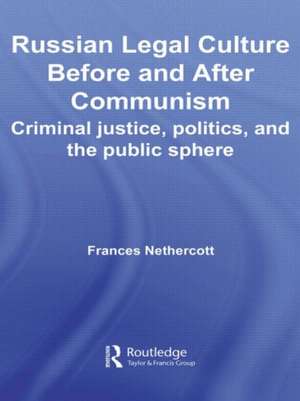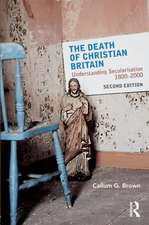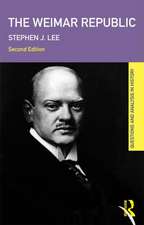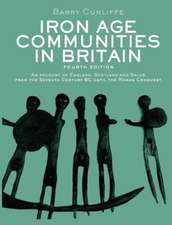Russian Legal Culture Before and After Communism: Criminal Justice, Politics and the Public Sphere: BASEES/Routledge Series on Russian and East European Studies
Autor Frances Nethercotten Limba Engleză Paperback – 14 iun 2012
Din seria BASEES/Routledge Series on Russian and East European Studies
- 8%
 Preț: 382.69 lei
Preț: 382.69 lei -
 Preț: 228.19 lei
Preț: 228.19 lei -
 Preț: 309.89 lei
Preț: 309.89 lei -
 Preț: 737.43 lei
Preț: 737.43 lei -
 Preț: 326.49 lei
Preț: 326.49 lei -
 Preț: 310.85 lei
Preț: 310.85 lei -
 Preț: 297.39 lei
Preț: 297.39 lei -
 Preț: 311.22 lei
Preț: 311.22 lei -
 Preț: 310.22 lei
Preț: 310.22 lei -
 Preț: 341.55 lei
Preț: 341.55 lei - 9%
 Preț: 1039.42 lei
Preț: 1039.42 lei - 18%
 Preț: 1271.75 lei
Preț: 1271.75 lei -
 Preț: 398.18 lei
Preț: 398.18 lei - 22%
 Preț: 298.10 lei
Preț: 298.10 lei - 18%
 Preț: 1059.84 lei
Preț: 1059.84 lei - 18%
 Preț: 1057.05 lei
Preț: 1057.05 lei - 18%
 Preț: 1062.26 lei
Preț: 1062.26 lei - 18%
 Preț: 1055.51 lei
Preț: 1055.51 lei - 18%
 Preț: 1057.75 lei
Preț: 1057.75 lei - 18%
 Preț: 1059.84 lei
Preț: 1059.84 lei - 25%
 Preț: 823.63 lei
Preț: 823.63 lei -
 Preț: 487.75 lei
Preț: 487.75 lei - 18%
 Preț: 1005.39 lei
Preț: 1005.39 lei - 18%
 Preț: 1000.27 lei
Preț: 1000.27 lei - 8%
 Preț: 382.79 lei
Preț: 382.79 lei - 18%
 Preț: 1059.84 lei
Preț: 1059.84 lei - 18%
 Preț: 1009.21 lei
Preț: 1009.21 lei - 18%
 Preț: 1059.84 lei
Preț: 1059.84 lei - 18%
 Preț: 1167.36 lei
Preț: 1167.36 lei - 18%
 Preț: 1060.87 lei
Preț: 1060.87 lei - 25%
 Preț: 771.71 lei
Preț: 771.71 lei - 18%
 Preț: 1059.84 lei
Preț: 1059.84 lei - 18%
 Preț: 1004.20 lei
Preț: 1004.20 lei - 18%
 Preț: 1053.92 lei
Preț: 1053.92 lei - 25%
 Preț: 515.72 lei
Preț: 515.72 lei - 18%
 Preț: 709.01 lei
Preț: 709.01 lei - 25%
 Preț: 823.08 lei
Preț: 823.08 lei - 18%
 Preț: 1112.90 lei
Preț: 1112.90 lei - 18%
 Preț: 1057.75 lei
Preț: 1057.75 lei - 18%
 Preț: 1065.75 lei
Preț: 1065.75 lei - 26%
 Preț: 850.73 lei
Preț: 850.73 lei - 18%
 Preț: 1055.51 lei
Preț: 1055.51 lei - 18%
 Preț: 1059.84 lei
Preț: 1059.84 lei - 25%
 Preț: 825.06 lei
Preț: 825.06 lei - 18%
 Preț: 734.50 lei
Preț: 734.50 lei - 26%
 Preț: 821.94 lei
Preț: 821.94 lei - 18%
 Preț: 1062.98 lei
Preț: 1062.98 lei - 18%
 Preț: 1002.63 lei
Preț: 1002.63 lei
Preț: 271.61 lei
Preț vechi: 326.04 lei
-17% Nou
Puncte Express: 407
Preț estimativ în valută:
51.98€ • 54.20$ • 43.20£
51.98€ • 54.20$ • 43.20£
Carte tipărită la comandă
Livrare economică 21 martie-04 aprilie
Preluare comenzi: 021 569.72.76
Specificații
ISBN-13: 9780415543149
ISBN-10: 0415543142
Pagini: 212
Dimensiuni: 156 x 234 mm
Greutate: 0.41 kg
Ediția:1
Editura: Taylor & Francis
Colecția Routledge
Seria BASEES/Routledge Series on Russian and East European Studies
Locul publicării:Oxford, United Kingdom
ISBN-10: 0415543142
Pagini: 212
Dimensiuni: 156 x 234 mm
Greutate: 0.41 kg
Ediția:1
Editura: Taylor & Francis
Colecția Routledge
Seria BASEES/Routledge Series on Russian and East European Studies
Locul publicării:Oxford, United Kingdom
Public țintă
Postgraduate and UndergraduateCuprins
Introduction 1. Fathers and Sons of Legal Reform 2. Reforming Criminal Justice (1864-1903) 3. Theorizing Crime and Punishment 4. Solov’ev as a Philosopher of Law 5. Criminal Justice in the Age of Revolution (1900-1917) 6. Rehabilitating Law: Criminal Justice after Communism. Afterword: Post-Soviet Legal Culture and Pre-Revolutionary Models
Notă biografică
Frances Nethercott is a Lecturer in Russian history at St Andrews University, UK. She specializes in intellectual and cultural history. Her previous publications include Une Rencontre Philosophique: Bergson en Russie, 1907-1917, and Russia's Plato: Plato and the Platonic Tradition in Russian Education, Science and Ideology, 1840-1930.
Recenzii
"Nethercott's book demonstrates how contemporary legal thinkers and reformers have found theoretical and practical inspiration from their imperial predecessors, while always acknowledging the inherent difficulties...In the end, this is a well-researched and thoughtful analysis of law in two vibrant eras of Russian history. This is a welcome addition to the literature on Russian law and legality useful for the student and scholar alike." - William B. Whisenhunt, The Russian Review (October 2008, Vol. 67, No. 4)
'Nethercott’s book is successful on several fronts. It may be of equal interest to historians, philosophers of law and jurists. It provides a rich discussion of the reception and adaptation of theories of crime and punishment by several generations of Russian legal thinkers. And it tracks the changing relationship between law and morality in Russian legal thought and practice.' - Stefan Kirmse, Humboldt-Universitat zu Berlin, H-Soz-u-Kult, June 2009
'Nethercott’s book is successful on several fronts. It may be of equal interest to historians, philosophers of law and jurists. It provides a rich discussion of the reception and adaptation of theories of crime and punishment by several generations of Russian legal thinkers. And it tracks the changing relationship between law and morality in Russian legal thought and practice.' - Stefan Kirmse, Humboldt-Universitat zu Berlin, H-Soz-u-Kult, June 2009
Descriere
Following the emancipation of the serfs in 1861, and again during the 1990s, individual legal rights occupied a central place in the drive to modernize criminal justice. This book explores these debates, focusing particularly on the work of Vladimir Solov'ev, a leading philosopher of law writing in the 1890s.






